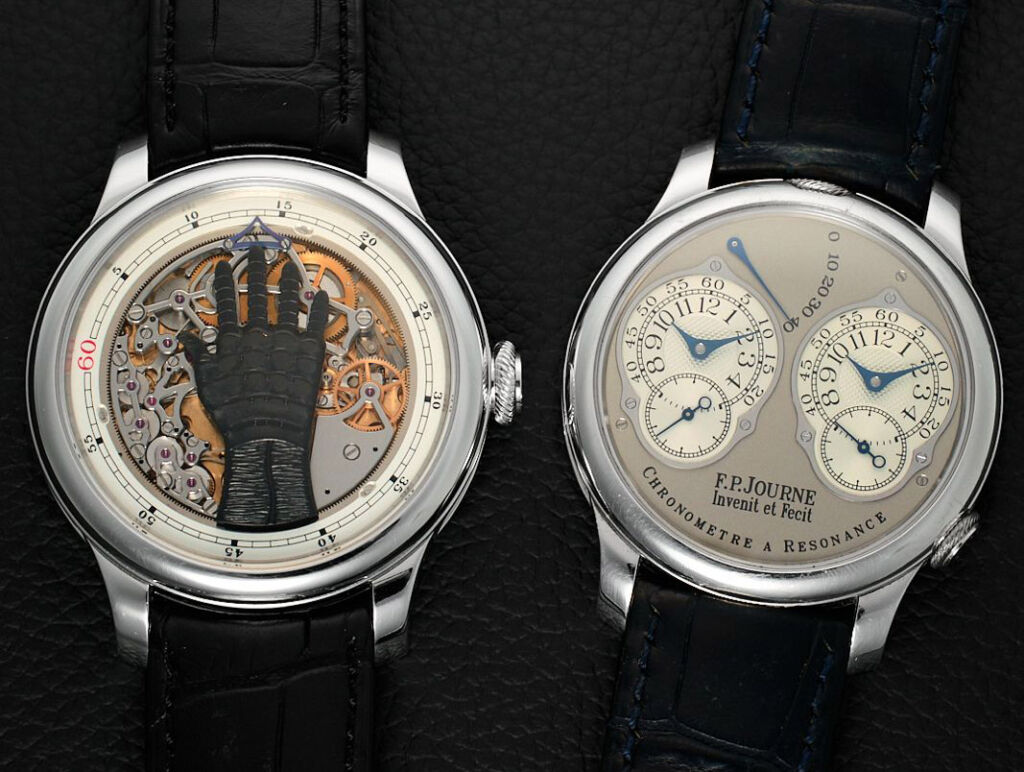Francis Ford Coppola’s $1 Million Watch Sale: ‘Godfather’ Director Forced to Sell After Megalopolis Disaster
The numbers paint a devastating picture for the director of The Godfather and Apocalypse Now. Coppola famously financed Megalopolis himself—reportedly sinking $120 million of his personal fortune, largely sourced from selling a stake in his renowned Napa Valley wine empire, to maintain absolute artistic control.
Against this colossal budget, the film’s worldwide box office gross has been painfully low, hovering at just over $14.3 million (as of October 2024). This unprecedented gap leaves Coppola facing a personal financial chasm that could exceed $100 million.

Coppola’s Unique F.P. Journe FFC Prototype Sets the Stage for a Historic Auction — Crafted exclusively for filmmaker Francis Ford Coppola, this one-of-a-kind timepiece marks the first watch in history to display time using a human hand. Estimated to fetch more than $1 million, it headlines Phillips’ December 2025 auction alongside rare Patek Philippe and Rolex pieces from Coppola’s personal collection.
To mitigate the damage, Coppola is now resorting to liquidating irreplaceable items. The centerpiece of the auction, scheduled for December 6–7, 2025, in New York, is the F.P. Journe "FFC Prototype." This one-of-a-kind timepiece, which he co-designed, is valued at roughly $1 million.
“Speaking with Francis in 2012 and hearing his idea on the use of a human hand to indicate time inspired me to create a watch I never could have imagined myself,” said renowned watchmaker François-Paul Journe in a statement, highlighting the deep personal and artistic connection Coppola is now forced to sever for cash flow.
According to analysis reviewed by Finance Monthly, this fire sale of luxury watches—including six other high-value pieces—underscores the severe nature of the Megalopolis financial loss.

Coppola’s Unique F.P. Journe FFC Prototype Sets the Stage for a Historic Auction — Crafted exclusively for filmmaker Francis Ford Coppola, this one-of-a-kind timepiece marks the first watch in history to display time using a human hand. Estimated to fetch more than $1 million, it headlines Phillips’ December 2025 auction alongside rare Patek Philippe and Rolex pieces from Coppola’s personal collection.
Financial Firewall: The One Lesson Everyone Can Take From Coppola’s Gamble
Francis Ford Coppola's dramatic personal financial loss after funding Megalopolis isn't just a Hollywood headline; it's a stark lesson for every consumer, entrepreneur, or side-hustler about the critical importance of a "financial firewall" between personal assets and business risks. While Coppola is a billionaire filmmaker, the principle of unlimited personal liability—which forced him to sell his unique watches—is a danger the average small business owner or creative freelancer faces every day.
The Danger of Blurring the Lines: Unlimited Liability
The core financial angle here is the danger of comingling funds and the absence of a protected legal structure. When a project fails, the first thing any smart investor asks is: "How insulated is my personal wealth?"
In the film world, studios typically use a structure that ring-fences the movie's failure from the parent company, known as limited liability. Coppola, by contrast, chose to self-fund using money from selling parts of his winery estate, creating a direct, personal link to the film's catastrophic underperformance. His personal assets, like his watch collection, became directly exposed to the business loss.
This mirrors what happens to an unincorporated small business owner (like a sole trader or partnership) whose business fails. Without setting up a Limited Company (Ltd) or a Limited Liability Company (LLC), there is no legal separation. This is called unlimited liability, meaning business debts can legally be collected from your home, car, or personal savings.
The Consequence: Losing Your Hard-Earned Assets
For the consumer, the consequence is clear: the personal safety net you spend a lifetime building can vanish almost instantly if the business collapses. The average cost of liquidating a failed startup or small business can be tens of thousands of dollars, a debt that personally rests on the founder if they lack a firewall. Coppola's $120 million gamble came from a place of immense wealth, but the principle is identical for the freelance graphic designer who uses their mortgage equity to buy new equipment.
Your Actionable Financial Insight: Build the Wall
The one key takeaway from Coppola's ordeal is the necessity of Corporate Separation. If you are running any kind of for-profit side business, even a modest one, do not operate it through your personal bank accounts or with your personal name as the only legal entity.
Practical Tip: Immediately establish a Limited Liability Company (LLC in the US) or a Limited Company (Ltd in the UK) for your venture. The legal setup cost is minor—often less than $500—but it instantly creates a legal 'firewall'. This legal structure is designed to absorb the business's failure, protecting your personal home, savings, and assets from the company's financial demise. Don't risk a lifetime of personal savings for the sake of skipping a simple incorporation process.
The Unyielding Artist: From Apocalypse Now to a Razzie
Coppola’s relentless commitment to art over commerce is legendary, even recalling his earlier struggle of mortgaging his Napa Valley winery to complete the chaotic production of Apocalypse Now. However, the scale of the Megalopolis loss far exceeds previous gambles.
Despite the critical backlash, the paltry box office, and even receiving a Worst Director Razzie Award (which he humorously accepted), the director remains defiant about his creative choice.
He spoke about his personal motivation for the project at the Cannes premiere: “I’ve never cared about money. My children don’t need a fortune. What matters is making something beautiful.”
This unwavering artistic conviction highlights the long-tail contradiction at the heart of the Megalopolis saga: a masterpiece or a folly, the film’s legacy is now inextricably tied to its status as one of the biggest personal financial losses in modern cinematic history. Coppola’s move to auction his unique timepiece in December confirms the disastrous financial conclusion to his most ambitious—and expensive—dream.













